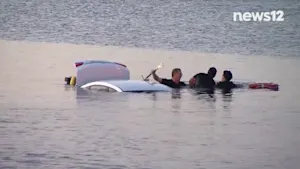More Stories
Police
are already preparing for more traffic stops in anticipation of the
legalization of the recreational use of marijuana in Connecticut – but testing
drivers for marijuana use is much harder than one may think.
News
12’s John Craven spoke with Norwalk Police Officer Tyrone Boyd, a federally-certified Drug Recognition Expert. After a suspect fails a field sobriety test, Boyd uses various medical tools to determine whether a driver is
high and which drug they may have taken. He says certain drugs affect a
person’s pupil size. Boyd also measures the suspect’s pulse, as well testing their
awareness of time, which can be significantly affected by marijuana use.
The
test is 12 steps and takes up to an hour.
Currently,
there are only 56 DREs in Connecticut.
But once recreational marijuana is legal, residents can expect many more of
them.
RELATED STORIES: Marijuana Matters
The
Connecticut ACLU says there's no scientific basis for drug recognition tests.
"Police
are police. They're not nurses. They're not doctors,” says Dan Barrett, the
group’s legal director. “I'd pay attention to whether they have the knowledge
to give these tests and interpret them correctly."
In
Georgia, the group is suing over mistaken arrests. At least four
states don’t accept drug recognition officers as expert witnesses. About a
dozen others do.
In
Connecticut, a DRE test is voluntary,
but under the new marijuana law, drivers would
have to submit to one or immediately
lose their license.
Boyd had to complete a month of rigorous DRE training, including
real-world tests in Arizona.
He stands by the test.
"It
was probably the most stressful training I've ever had in my life,” he said.
"You have to successfully complete 12 drug evaluations, and we actually
did those on actual inmates."
Norwalk
has two of drug recognition experts. If a neighboring department needs one,
they can also lend them out.
If the
marijuana bill passes, drivers who fail a field sobriety test would have to
agree to a drug recognition test. That rule would start next April.
More from News 12
2:34

Guide: Safety tips to help prevent home burglaries
2:19

Guide: Safety measures to help prevent fires and how to escape one
2:07

Tips on how to avoid confrontation with sharks while swimming in the ocean
2:33

5 tips to prevent mosquito bites and getting sick from viruses
2:39

NEWS 12 EXCLUSIVE: ‘He drove into the water.’ Car drives off dock in Patchogue; News 12 crew helps in the rescue
0:44
